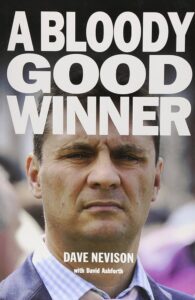 I’ve been reading Dave Nevison’s book: A Bloody Good Winner: Life as a Professional Gambler.
I’ve been reading Dave Nevison’s book: A Bloody Good Winner: Life as a Professional Gambler.
I know what you are saying: ‘You must be a slow reader, it was published by Highdown in June 2008.’ For those of a sarcastic nature, I’ve read the book a few times. Every so often I like to recap and assess my progress as a gambler with the thoughts of Mr. Nevison. Things have moved on a little some 15-years later but the foundations to gambling don’t change too much from a philosophical standing.
Well, that’s what I say.
It’s interesting to read about the early days of Nevison’s gambling life as a pro punter back in 1993. Going from working in the City as a foreign currency trader – where deals were in the millions – to getting a bet on at a blustery racecourse were literally poles apart. It was a learning curve on so many fronts and by all accounts a difficult pill to swallow. He often he wished he could go back to those leisurely years where money really wasn’t a problem.
Not only did he struggle in those early years but he found his approach was all wrong. Being a traditional gambler, he would find a couple of decent bets on the card and bet on the nose which worked well if they came in but if they lost he found himself chasing his losses because he didn’t much fancy heading back on the train to Kent with that empty feeling in his pockets.
Things weren’t going to plan until he bumped into another familiar face Eddie ‘The Shoe’ Fremantle who was much more successful in his pro gambling with a very different stance on how to find value bets.
Fremantle made his own tissue on each horse in each race and looked to see how they compared to those of the bookmakers. If he had a horse priced 2/1 and the bookies had it at 5/1 he’d bet on the potential value. He may even bet on a number of horses in the same race. If his tissue odds detailed value he would win and the bookmakers would lose.
Upon hearing this approach, Nevison had a eureka moment and couldn’t believe he hadn’t worked it out for himself. From that day he formed his own tissue prices and by all accounts never looked back. He had found the key to being a successful professional gambler. Not only did it allow him to make the most of a race card (being able to bet in every race) but it also helped spread the money around with some bookmakers winning while perhaps one lost. This was a crucial part of his success in getting bets on rather than betting on one or two horses on the card. Bookmakers would be wary of taking selective bets if they were frequently digging into their readies.
A Bloody Good Winner is a great book for not only its humour and big bets but also from a learning point of view. Nevison could have started his book at any point of his professional gambling journey which may have given the impression he never backed a loser. But he is an honest bloke who didn’t flinch from detailing that his early years didn’t go to plan, that he made mistakes and listened to someone who had a better approach.
He says to this day that he appreciates and respects Eddie Fremantle while his book was rather scathing at other pro gamblers at the time who he felt didn’t put their money where their mouth is or simply bet such small money it could barley cover the costs of living.
Gambling is very much a learning experience. You don’t just wake up one day and find you are a successful professional gambler. It’s a journey of trial and error. It is a life of hard knock. But, like Nevison, it was a profession he felt he had to take because it was his ambition.
He did it well.